 After a commentary on the role of perspective and the art of storytelling, this Julio Cortázar story goes on to describe how an amateur photographer captures an image that seemingly comes alive, rewriting its narrative. While taking the photograph (of an adolescent boy in an obviously uncomfortable discussion with an adult woman) he comes up with several possible interpretations of what is taking place and what may happen afterwards. Things take a dark turn when he realizes that a man in a nearby car is part of the narrative. Themes include storytelling, narrative perspective, speculation, obsession, artistic imagery vs. reality. More…
After a commentary on the role of perspective and the art of storytelling, this Julio Cortázar story goes on to describe how an amateur photographer captures an image that seemingly comes alive, rewriting its narrative. While taking the photograph (of an adolescent boy in an obviously uncomfortable discussion with an adult woman) he comes up with several possible interpretations of what is taking place and what may happen afterwards. Things take a dark turn when he realizes that a man in a nearby car is part of the narrative. Themes include storytelling, narrative perspective, speculation, obsession, artistic imagery vs. reality. More…
Category Archives: Short Stories
Day of the Butterfly
 The themes of this distressing story from Alice Munro are being different, isolation, bullying, connection and betrayal. Myra’s family looks and dresses differently. At school, her introverted younger brother needs her constant support and protection. The other children in her class (always in groups of course!) ridicule her. For most of them, feigned acceptance comes when Myra is hospitalized with leukemia and it becomes fashionable to be seen to care. Sadly, a brief period of connection with the narrator ends with a decision to discard what may have been Myra’s last ever gift More…
The themes of this distressing story from Alice Munro are being different, isolation, bullying, connection and betrayal. Myra’s family looks and dresses differently. At school, her introverted younger brother needs her constant support and protection. The other children in her class (always in groups of course!) ridicule her. For most of them, feigned acceptance comes when Myra is hospitalized with leukemia and it becomes fashionable to be seen to care. Sadly, a brief period of connection with the narrator ends with a decision to discard what may have been Myra’s last ever gift More…
The Budget
 The major theme of this satirical tale by Mario Benedetti is the inefficiency of government bureaucracy and decision-making in 1940s Uruguay. A small government Office, which doesn’t seem to exist for any purpose, has operated within the same annual budget for decades. When its financially struggling staff hear rumours of an imminent budget increase, they go into debt and splurge on luxuries as if a salary increase had already been granted. A year later, as the paperwork weaves its way through the Ministerial approval process, the disillusioned employees are still waiting. Other themes include indolence, hope and disillusionment. More…
The major theme of this satirical tale by Mario Benedetti is the inefficiency of government bureaucracy and decision-making in 1940s Uruguay. A small government Office, which doesn’t seem to exist for any purpose, has operated within the same annual budget for decades. When its financially struggling staff hear rumours of an imminent budget increase, they go into debt and splurge on luxuries as if a salary increase had already been granted. A year later, as the paperwork weaves its way through the Ministerial approval process, the disillusioned employees are still waiting. Other themes include indolence, hope and disillusionment. More…
A Very Old Man With Enormous Wings
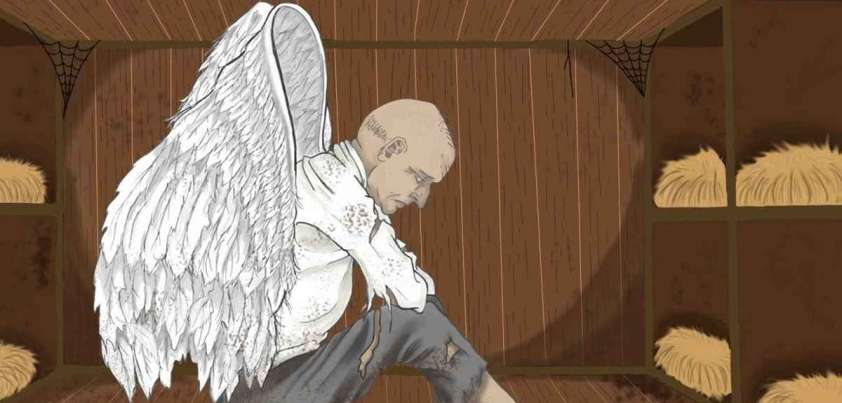 The major themes of this story by Gabriel García Márquez are doubt, cruelty and greed, and common reactions to those who appear strange or “different”. The treatment of the out of sorts angel and “spider girl” evoke genuine pathos and carry allusions to how some countries lock up refugees in miserable conditions and the likes of Joseph Merrick (the deformed gentleman paraded around 19th century England as The Elephant Man). The only uplifting moment comes when the innocent child climbs through a hole in the old man’s cage to play with him. Other themes include suffering, religion and the supernatural. More…
The major themes of this story by Gabriel García Márquez are doubt, cruelty and greed, and common reactions to those who appear strange or “different”. The treatment of the out of sorts angel and “spider girl” evoke genuine pathos and carry allusions to how some countries lock up refugees in miserable conditions and the likes of Joseph Merrick (the deformed gentleman paraded around 19th century England as The Elephant Man). The only uplifting moment comes when the innocent child climbs through a hole in the old man’s cage to play with him. Other themes include suffering, religion and the supernatural. More…
Mrs. Spring Fragrance
 This story by Sui Sin Far explores the “Americanization” of Chinese immigrant families in the early 1900s. A Chinese-American woman (Mrs. Spring Fragrance) helps her neighbor’s daughter escape an arranged marriage so that she can marry her true love. Thanks to a misunderstanding over a line of poetry, when she travels to another city to find a suitable match for the other man, her husband suspects she is having an affair with him. Through extensive use of irony, the story highlights themes of jealousy, culture clash, identity, gender roles, and community and political racism and discrimination. More…
This story by Sui Sin Far explores the “Americanization” of Chinese immigrant families in the early 1900s. A Chinese-American woman (Mrs. Spring Fragrance) helps her neighbor’s daughter escape an arranged marriage so that she can marry her true love. Thanks to a misunderstanding over a line of poetry, when she travels to another city to find a suitable match for the other man, her husband suspects she is having an affair with him. Through extensive use of irony, the story highlights themes of jealousy, culture clash, identity, gender roles, and community and political racism and discrimination. More…
The Perfect Match
 In this dystopian story by Ken Liu, a powerful cyber system gathers information on the habits, desires and preferences of almost everyone in the world. Through its motherly virtual assistant “Tilly” (Hey Google!), it uses this information to control unfavourable governments and manipulate user’s lives, including autosuggesting products from advertising partners. A member of a rebellious hacking group and disillusioned lawyer caught trying to take down the system are made an offer they cannot refuse. Themes include corporate greed vs. “benevolence”, the dangers of overreliance on AI (blind acceptance and loss of humanity), manipulation and control, rebellion. More…
In this dystopian story by Ken Liu, a powerful cyber system gathers information on the habits, desires and preferences of almost everyone in the world. Through its motherly virtual assistant “Tilly” (Hey Google!), it uses this information to control unfavourable governments and manipulate user’s lives, including autosuggesting products from advertising partners. A member of a rebellious hacking group and disillusioned lawyer caught trying to take down the system are made an offer they cannot refuse. Themes include corporate greed vs. “benevolence”, the dangers of overreliance on AI (blind acceptance and loss of humanity), manipulation and control, rebellion. More…
Diamond Dust: A Tragedy
 This story by Anita Desai uses dark humor to highlight themes of loneliness, pet love, tolerance, alienation, conformity and fulfillment. A puppy of “indecipherable” breed brought home by a conservative Indian public servant causes havoc in his home and neighborhood as it grows into an almost uncontrollable, ferocious badmash. Mr Das, who has a secure job and is seemingly happily married, is clearly missing something in life. Although his obsession with the dog fills this gap and brings about a kind of second childhood, it leads to condemnation and ridicule from his wife and colleagues, and anger from the community. More…
This story by Anita Desai uses dark humor to highlight themes of loneliness, pet love, tolerance, alienation, conformity and fulfillment. A puppy of “indecipherable” breed brought home by a conservative Indian public servant causes havoc in his home and neighborhood as it grows into an almost uncontrollable, ferocious badmash. Mr Das, who has a secure job and is seemingly happily married, is clearly missing something in life. Although his obsession with the dog fills this gap and brings about a kind of second childhood, it leads to condemnation and ridicule from his wife and colleagues, and anger from the community. More…
What I Saw from Where I Stood
 This story by Marisa Silver is about a couple’s struggle to keep their marriage together after the miscarriage of their first child. Told from the husband’s point of view, it describes his wife’s trauma and slow recovery, which is set back by a carjacking in which they are held at gunpoint. This results in paranoia over security (so much so that she locks herself away over Halloween) and a rat in their bedroom wall. In a desperate attempt to save the marriage, he decides to take charge. Themes include loss, trauma and heartache, compassion and support, “flukishness”, disillusionment, paranoia. More…
This story by Marisa Silver is about a couple’s struggle to keep their marriage together after the miscarriage of their first child. Told from the husband’s point of view, it describes his wife’s trauma and slow recovery, which is set back by a carjacking in which they are held at gunpoint. This results in paranoia over security (so much so that she locks herself away over Halloween) and a rat in their bedroom wall. In a desperate attempt to save the marriage, he decides to take charge. Themes include loss, trauma and heartache, compassion and support, “flukishness”, disillusionment, paranoia. More…
Now That April’s Here
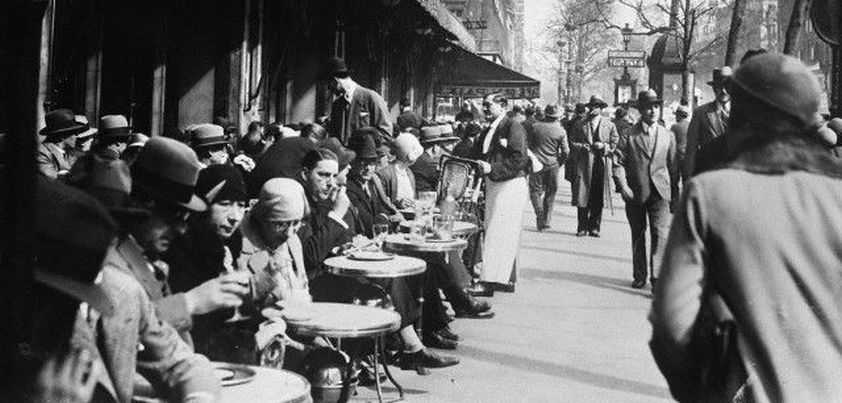 This story by Morley Callaghan is a bitter-sweet satire of the “lost generation”, a group of American expatriate writers living in Paris during the 1920s. Two men, obviously lovers, travel to France because America had nothing to offer them. One has a small income, the other is an aspiring writer. They appear to thrive in the local café society, constantly snickering over people they meet. All is well until they offer shared accommodation to a promiscuous young woman who shares her pleasures with them in return. Themes include disenchantment, search for fulfillment, sexuality, dependence, hedonism, jealousy, abandonment. More…
This story by Morley Callaghan is a bitter-sweet satire of the “lost generation”, a group of American expatriate writers living in Paris during the 1920s. Two men, obviously lovers, travel to France because America had nothing to offer them. One has a small income, the other is an aspiring writer. They appear to thrive in the local café society, constantly snickering over people they meet. All is well until they offer shared accommodation to a promiscuous young woman who shares her pleasures with them in return. Themes include disenchantment, search for fulfillment, sexuality, dependence, hedonism, jealousy, abandonment. More…
This Is Earle Sandt
 This Robert Olen Butler story is loosely based on the death of American aviator Earle Sandt. A small town banker attends an aerial exhibition with his young son. It is the first time either has seen an aeroplane, and they witness the crash that killed the pioneer pilot. Both are traumatised. The boy recovers quickly, but not so the banker whose ordered world and religious faith have been shaken. He begins to identify with Sandt, asking: Did I sense a God all about me in the sky?, and answering: Forgive me, no. Themes include progress/change, mortality, faith, despair, identity. More…
This Robert Olen Butler story is loosely based on the death of American aviator Earle Sandt. A small town banker attends an aerial exhibition with his young son. It is the first time either has seen an aeroplane, and they witness the crash that killed the pioneer pilot. Both are traumatised. The boy recovers quickly, but not so the banker whose ordered world and religious faith have been shaken. He begins to identify with Sandt, asking: Did I sense a God all about me in the sky?, and answering: Forgive me, no. Themes include progress/change, mortality, faith, despair, identity. More…
The Sniper
 Some argue that civil wars are the worst form of warfare because they can set friend against friend and family against family. This story by Liam O’Flaherty takes place during the Irish Civil War of 1922/23. After an IRA sniper with the cold gleam of the fanatic in his eyes kills an enemy sniper, he goes to see if he knew the man. It is tempting to feel sorry as he turns over the body. That is until you remember the unarmed woman he had just shot in cold blood. Themes include war, divisiveness, duty, survival, isolation, brutality, guilt. More…
Some argue that civil wars are the worst form of warfare because they can set friend against friend and family against family. This story by Liam O’Flaherty takes place during the Irish Civil War of 1922/23. After an IRA sniper with the cold gleam of the fanatic in his eyes kills an enemy sniper, he goes to see if he knew the man. It is tempting to feel sorry as he turns over the body. That is until you remember the unarmed woman he had just shot in cold blood. Themes include war, divisiveness, duty, survival, isolation, brutality, guilt. More…
Last Night
 This story by James Salter explores the theme of euthanasia (enabling assisted death with dignity for those for whom natural death will involve great suffering). A woman with an incurable illness enlists her husband to help her die. After the couple enjoy a last night out with a close friend, we learn that the man is not the loyal and loving husband we first thought him to be. He receives a surprise the next morning as the title of the story takes on a new meaning. Other themes include materialism, taking life for granted, betrayal, adultery, rape More…
This story by James Salter explores the theme of euthanasia (enabling assisted death with dignity for those for whom natural death will involve great suffering). A woman with an incurable illness enlists her husband to help her die. After the couple enjoy a last night out with a close friend, we learn that the man is not the loyal and loving husband we first thought him to be. He receives a surprise the next morning as the title of the story takes on a new meaning. Other themes include materialism, taking life for granted, betrayal, adultery, rape More…
The Bakery Attack / Second Bakery Attack
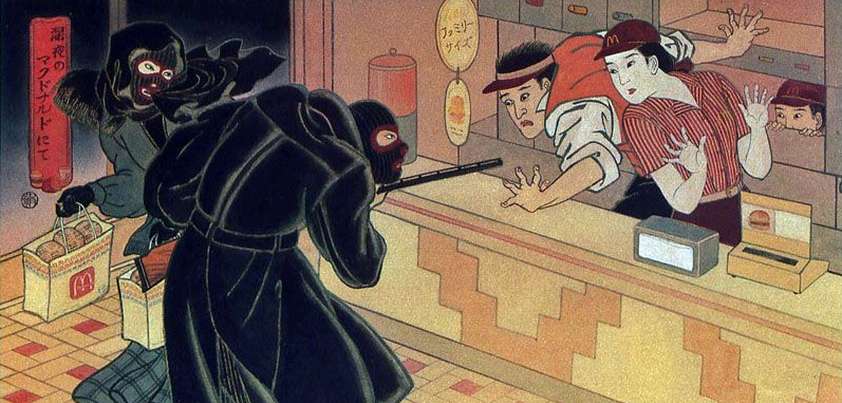 The Second Bakery Attack, one of Haruki Murakami’s most popular stories, is the sequel to an earlier, less well-known work. In the first story, an empty stomach symbolizes a life empty of ambition and intellectual stimulation. In the second, it symbolizes the insecurity inherent in a recently married couple’s (as yet) superficial relationship. The man has a lot to learn about his new wife, as becomes clear when she proves surprisingly adept at planning and carrying out a robbery. For the couple, the successful robbery proves a bonding, curse-lifting experience. Themes include marriage, insecurity, gender roles/’manhood’, the supernatural, change (Westernization). More…
The Second Bakery Attack, one of Haruki Murakami’s most popular stories, is the sequel to an earlier, less well-known work. In the first story, an empty stomach symbolizes a life empty of ambition and intellectual stimulation. In the second, it symbolizes the insecurity inherent in a recently married couple’s (as yet) superficial relationship. The man has a lot to learn about his new wife, as becomes clear when she proves surprisingly adept at planning and carrying out a robbery. For the couple, the successful robbery proves a bonding, curse-lifting experience. Themes include marriage, insecurity, gender roles/’manhood’, the supernatural, change (Westernization). More…
Showdown
 A major theme of this Shirley Jackson story is community responsibility in preventing violence. Before the “showdown”, young Billy’s Saturdays were quiet and uneventful. When Tom Harper’s death breaks the pattern, a mystical power puts Billy (and possibly other townspeople) into a time loop. After many repeated Saturdays, Billy realizes that to break the cycle he must do something to prevent Tom’s death. Could the “haunting” be a result of Tom’s girlfriend Susy’s promises: I won’t ever forget you, and neither will anyone else! I’ll see that they don’t get off easy! Other themes: violence, love, hope, revenge, the supernatural. More…
A major theme of this Shirley Jackson story is community responsibility in preventing violence. Before the “showdown”, young Billy’s Saturdays were quiet and uneventful. When Tom Harper’s death breaks the pattern, a mystical power puts Billy (and possibly other townspeople) into a time loop. After many repeated Saturdays, Billy realizes that to break the cycle he must do something to prevent Tom’s death. Could the “haunting” be a result of Tom’s girlfriend Susy’s promises: I won’t ever forget you, and neither will anyone else! I’ll see that they don’t get off easy! Other themes: violence, love, hope, revenge, the supernatural. More…
The Bet
 This Anton Chekhov opens with a dinner discussion about capital punishment. A banker claims the death penalty is kind because a lifetime in prison is not worth living. A lawyer argues that any life is better than no life at all. To prove his point, the banker bets the lawyer a small fortune that he couldn’t survive being locked up for many years with minimal contact with the outside world. Towards the end of the period, the banker visits him with murderous intent. Themes include crime and punishment, idealism and conviction, isolation and dehumanization, acquired wisdom, greed and excess. More…
This Anton Chekhov opens with a dinner discussion about capital punishment. A banker claims the death penalty is kind because a lifetime in prison is not worth living. A lawyer argues that any life is better than no life at all. To prove his point, the banker bets the lawyer a small fortune that he couldn’t survive being locked up for many years with minimal contact with the outside world. Towards the end of the period, the banker visits him with murderous intent. Themes include crime and punishment, idealism and conviction, isolation and dehumanization, acquired wisdom, greed and excess. More…
The Pit and the Pendulum
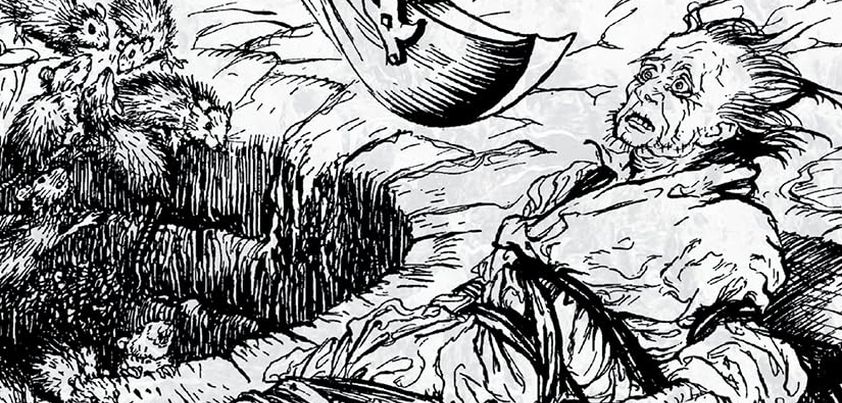 In this story by Edgar Allan Poe, a man in a dreamlike state of consciousness swoons upon being sentenced to death by the Spanish Inquisition. He wakes to find himself tied to a wooden frame in a chamber housing three forms of horrific death: a deep, water-filled pit; a slowly descending, razor-sharp pendulum; and contracting, red-hot walls. After almost giving up and welcoming death, he finds the will to live and devises a plan to escape the pendulum. As the walls close in, an unexpected visitor saves him. Themes include injustice, sadism, fear, time, the will to live, inventiveness, salvation More…
In this story by Edgar Allan Poe, a man in a dreamlike state of consciousness swoons upon being sentenced to death by the Spanish Inquisition. He wakes to find himself tied to a wooden frame in a chamber housing three forms of horrific death: a deep, water-filled pit; a slowly descending, razor-sharp pendulum; and contracting, red-hot walls. After almost giving up and welcoming death, he finds the will to live and devises a plan to escape the pendulum. As the walls close in, an unexpected visitor saves him. Themes include injustice, sadism, fear, time, the will to live, inventiveness, salvation More…
A White Heron
 A major theme of this story from Sarah Orne Jewett is exploitation of nature. A young girl (Sylvia) must choose between much needed money and protecting a rare, beautiful bird. Some see the story as a metaphor for industrialization encroaching upon the pristine Maine woods. The repeated references to “whiteness” (the heron, cow’s milk, Sylvia’s pale skin), symbolize the purity of both the environment and the girl. Other themes: temptation, feminism (the right for Sylvia [women] to live as she chooses and not to serve and follow him [a man] and love him as a dog loves!) More…
A major theme of this story from Sarah Orne Jewett is exploitation of nature. A young girl (Sylvia) must choose between much needed money and protecting a rare, beautiful bird. Some see the story as a metaphor for industrialization encroaching upon the pristine Maine woods. The repeated references to “whiteness” (the heron, cow’s milk, Sylvia’s pale skin), symbolize the purity of both the environment and the girl. Other themes: temptation, feminism (the right for Sylvia [women] to live as she chooses and not to serve and follow him [a man] and love him as a dog loves!) More…
Blood-Burning Moon
 Set in the American South during the days of enforced segregation, this story by Jean Toomer involves a love triangle between Louisa, an attractive young African-American woman and two men. Bob (the entitled son a white planter whose slaves were freed and landholdings reduced after the Civil War) picks a fight with his adversary Tom (a poor, quick-tempered black labourer). When Bob pulls a knife, Tom does likewise and kills him. In keeping with the times, Tom is gruesomely executed by a white vigilante mob. Themes: love vs. lust, racism/white supremacy, identity, violence, vigilante justice. More…
Set in the American South during the days of enforced segregation, this story by Jean Toomer involves a love triangle between Louisa, an attractive young African-American woman and two men. Bob (the entitled son a white planter whose slaves were freed and landholdings reduced after the Civil War) picks a fight with his adversary Tom (a poor, quick-tempered black labourer). When Bob pulls a knife, Tom does likewise and kills him. In keeping with the times, Tom is gruesomely executed by a white vigilante mob. Themes: love vs. lust, racism/white supremacy, identity, violence, vigilante justice. More…
Monster
 The titular Monster in this story by Catherine Lim is an old, rickety, bug-infested bed, treasured by a frail woman in her seventies and despised by her daughter-in-law. Set in highly competitive Singapore, the other monster in the house is generational conflict arising from a fundamental cultural change: a growing lack of respect, understanding and compassion for the aged. Ironically, when the daughter-in-law is finally in a position to destroy the much-hated bed, she learns it may be worth a lot of money! Themes include generational conflict, cultural change (less respect for the aged), sentimentality, materialism, social class. More…
The titular Monster in this story by Catherine Lim is an old, rickety, bug-infested bed, treasured by a frail woman in her seventies and despised by her daughter-in-law. Set in highly competitive Singapore, the other monster in the house is generational conflict arising from a fundamental cultural change: a growing lack of respect, understanding and compassion for the aged. Ironically, when the daughter-in-law is finally in a position to destroy the much-hated bed, she learns it may be worth a lot of money! Themes include generational conflict, cultural change (less respect for the aged), sentimentality, materialism, social class. More…
A Vermont Tale
 In this story by Mark Helprin, two children from a distressed marriage are sent to live for a period on their grandparents’ idyllic Vermont farm. One night, they are frightened by the call of two Arctic loons. To calm them and perhaps provide hope about their parents, the grandfather tells a tale about two loons. The story is an allegory of his marriage, with themes of love, infidelity, separation, despair and reunion. Unfortunately, we learn later that the story’s “happily ever after” ending does not match reality. Themes of the frame story include natural beauty, childhood innocence, appearance vs. reality. More…
In this story by Mark Helprin, two children from a distressed marriage are sent to live for a period on their grandparents’ idyllic Vermont farm. One night, they are frightened by the call of two Arctic loons. To calm them and perhaps provide hope about their parents, the grandfather tells a tale about two loons. The story is an allegory of his marriage, with themes of love, infidelity, separation, despair and reunion. Unfortunately, we learn later that the story’s “happily ever after” ending does not match reality. Themes of the frame story include natural beauty, childhood innocence, appearance vs. reality. More…
Train
 In this story by Joy Williams, a sensitive, compassionate girl (Dan) rides a long-distance train with the family of a rude, cynical, self-absorbed friend (Jane). The two ten-year-olds spend much of the time walking through the train interacting with Jane’s argumentative, pretentious parents and other passengers. Dan, who has problems of her own at home, “comes of age” as she realizes the world is not always a happy place, and that Jane is unfit to be her friend. Surprisingly, Jane’s father seems to have a similar opinion of his daughter! Themes include friendship, family dysfunction, conflict, loneliness, epiphany. More…
In this story by Joy Williams, a sensitive, compassionate girl (Dan) rides a long-distance train with the family of a rude, cynical, self-absorbed friend (Jane). The two ten-year-olds spend much of the time walking through the train interacting with Jane’s argumentative, pretentious parents and other passengers. Dan, who has problems of her own at home, “comes of age” as she realizes the world is not always a happy place, and that Jane is unfit to be her friend. Surprisingly, Jane’s father seems to have a similar opinion of his daughter! Themes include friendship, family dysfunction, conflict, loneliness, epiphany. More…
Adam and Eve and Pinch Me
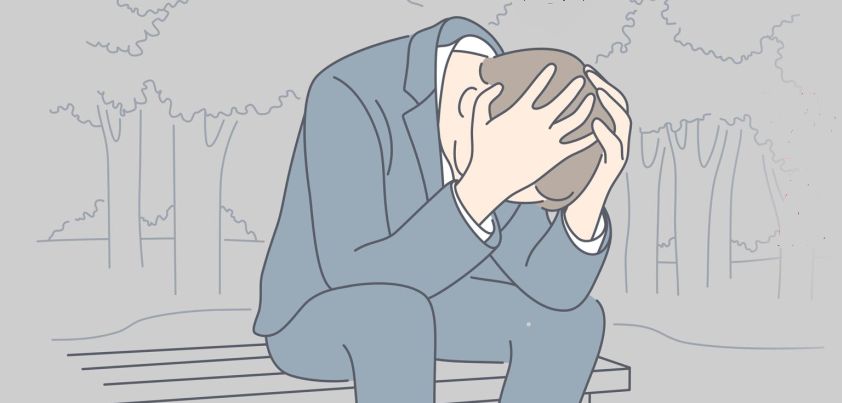 In one of A. E. Coppard’s more enigmatic stories, a confused man finds himself unable to open the doors in his house or communicate with his three children or servants. The inference is that he is dead and doesn’t know it. Relief comes when he awakens from a daydream with his wife beside him. However, he has a different identity and the third child featured in the dream, who had special powers, has not yet been born. Themes include the convergence of reality and fantasy, death, family, frustration, anger, precognition, identity. More…
In one of A. E. Coppard’s more enigmatic stories, a confused man finds himself unable to open the doors in his house or communicate with his three children or servants. The inference is that he is dead and doesn’t know it. Relief comes when he awakens from a daydream with his wife beside him. However, he has a different identity and the third child featured in the dream, who had special powers, has not yet been born. Themes include the convergence of reality and fantasy, death, family, frustration, anger, precognition, identity. More…
A Distant Episode
 In this story by Paul Bowles a Moroccan café worker lures a patronizing Western linguist to a quarry where he is kidnapped by a feared nomadic tribe. He is beaten, has his tongue cut out, and over the next year dehumanized by having to perform clown-like antics to entertain the tribe during their travels. The constant indignity breaks down his reasoning which, despite a moment of awareness when they sell him to another tribe, ends in insanity and a mad rush into the night. Themes include arrogance, cultural naivety, cruelty, dehumanization, (loss of) identity, madness. More…
In this story by Paul Bowles a Moroccan café worker lures a patronizing Western linguist to a quarry where he is kidnapped by a feared nomadic tribe. He is beaten, has his tongue cut out, and over the next year dehumanized by having to perform clown-like antics to entertain the tribe during their travels. The constant indignity breaks down his reasoning which, despite a moment of awareness when they sell him to another tribe, ends in insanity and a mad rush into the night. Themes include arrogance, cultural naivety, cruelty, dehumanization, (loss of) identity, madness. More…
The Postmaster
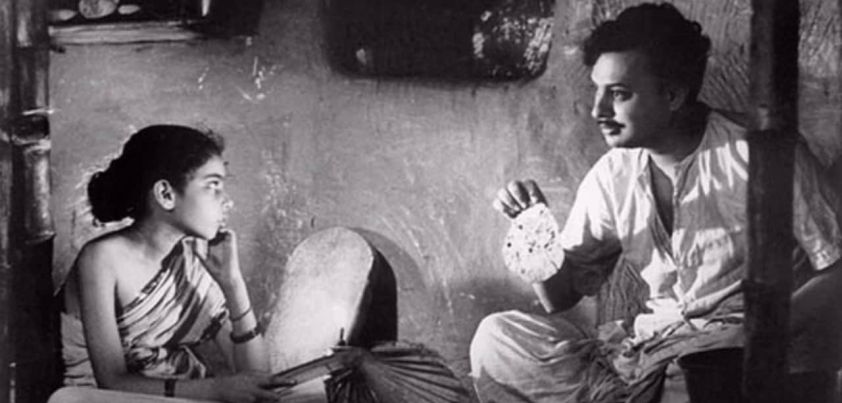 For me, the major theme of this Rabindranath Tagore story is the insensitivity towards others under India’s caste system. An inexperienced postal officer from a big city is sent to work in a remote rural village. He lives a lonely, isolated life because class differences and immaturity make it difficult for him to integrate into the local community. His only companion is his housekeeper, a young orphaned girl. The two develop a strong bond, which leaves the devoted girl shattered with her callous treatment when he decides to leave. Other themes: natural beauty, alienation, loneliness, memories, family, companionship, guilt. More…
For me, the major theme of this Rabindranath Tagore story is the insensitivity towards others under India’s caste system. An inexperienced postal officer from a big city is sent to work in a remote rural village. He lives a lonely, isolated life because class differences and immaturity make it difficult for him to integrate into the local community. His only companion is his housekeeper, a young orphaned girl. The two develop a strong bond, which leaves the devoted girl shattered with her callous treatment when he decides to leave. Other themes: natural beauty, alienation, loneliness, memories, family, companionship, guilt. More…
The Machine That Won the War
 This story by Isaac Asimov remains relevant today as technology plays an increasing role in controlling everything from military applications to crucial infrastructure. An inter-planetary war has been won, Earth is safe, and three men bask in the glory. Ironically, it wasn’t won by a machine or any of the three ‘experts’. It was won either by chance or because of problems experienced by the enemy. Pointedly, no thought is given to the rights and wrongs of the war, or the suffering on both sides. Themes include war, hubris, the fallibility of machine and human decision-making, chance. More…
This story by Isaac Asimov remains relevant today as technology plays an increasing role in controlling everything from military applications to crucial infrastructure. An inter-planetary war has been won, Earth is safe, and three men bask in the glory. Ironically, it wasn’t won by a machine or any of the three ‘experts’. It was won either by chance or because of problems experienced by the enemy. Pointedly, no thought is given to the rights and wrongs of the war, or the suffering on both sides. Themes include war, hubris, the fallibility of machine and human decision-making, chance. More…
Mrs. Bathurst
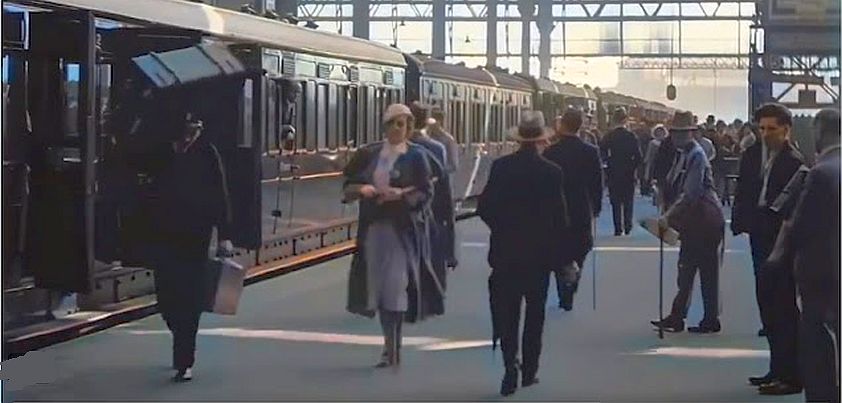 A major theme of this enigmatic story by Rudyard Kipling is the potential destructive power of love. Interestingly, we never meet the two central characters: Mrs. Bathurst, a New Zealand hotel keeper renowned for her kindness to needy sailors, and “Click” Vickery, a naval warrant officer who once had a serious affair with her. Vickery becomes so obsessed with a cinematograph clip in a traveling circus showing Mrs. Bathurst in London that he deserts his ship and follows the circus to the next town. Other themes include alienation, chance and accident, ambiguity, passion, death and guilt. More…
A major theme of this enigmatic story by Rudyard Kipling is the potential destructive power of love. Interestingly, we never meet the two central characters: Mrs. Bathurst, a New Zealand hotel keeper renowned for her kindness to needy sailors, and “Click” Vickery, a naval warrant officer who once had a serious affair with her. Vickery becomes so obsessed with a cinematograph clip in a traveling circus showing Mrs. Bathurst in London that he deserts his ship and follows the circus to the next town. Other themes include alienation, chance and accident, ambiguity, passion, death and guilt. More…
A Way of Talking
 The major theme of this story from Patricia Grace is casual racism: the habit of using a racial descriptor (in this case the terms Maori and Pakeha) in a way that infers all members of an ethnic or cultural group share the same characteristics. Set in New Zealand, an indigenous university student visiting her home town for her sister’s wedding teaches the older girl a new “way of talking” when confronted with discriminatory or racist language. Other themes: cultural and individual identity; education as a force for social change; the courage to speak out, even if standing alone. More…
The major theme of this story from Patricia Grace is casual racism: the habit of using a racial descriptor (in this case the terms Maori and Pakeha) in a way that infers all members of an ethnic or cultural group share the same characteristics. Set in New Zealand, an indigenous university student visiting her home town for her sister’s wedding teaches the older girl a new “way of talking” when confronted with discriminatory or racist language. Other themes: cultural and individual identity; education as a force for social change; the courage to speak out, even if standing alone. More…
Hands
 Sherwood Anderson’s Hands was a ground-breaking story for its time. A young teacher is so traumatized by false accusations of child molestation that he flees, changes his identity, and shuts himself off from the world. He is now a frightened loner, with only one friend in the world and a nervous tic in his hands. Themes: mob “justice”, isolation and loneliness, living in fear, embracing one’s dreams. Many people, like the protagonist, express their emotions in a “touchy feely” way. Sadly, even today, such people need to be careful lest this be misinterpreted or maliciously used against them. More…
Sherwood Anderson’s Hands was a ground-breaking story for its time. A young teacher is so traumatized by false accusations of child molestation that he flees, changes his identity, and shuts himself off from the world. He is now a frightened loner, with only one friend in the world and a nervous tic in his hands. Themes: mob “justice”, isolation and loneliness, living in fear, embracing one’s dreams. Many people, like the protagonist, express their emotions in a “touchy feely” way. Sadly, even today, such people need to be careful lest this be misinterpreted or maliciously used against them. More…
Eveline
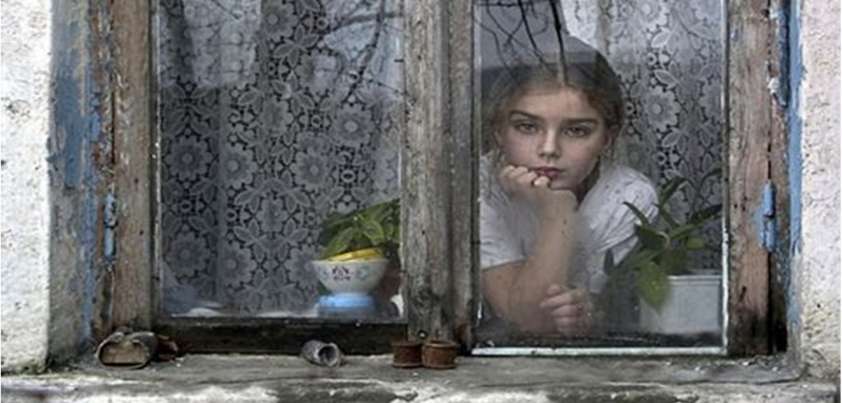 A major theme of James Joyce’s Eveline is gender roles in early 20th century Dublin (the limited life choices available to young women from working-class families of the time). Faced with no meaningful job opportunities, they were expected to act as unpaid family help until married. Children may then bring some joy, but the rest of their lives would consist of the same inescapable drudgery and potential abuse as at home. Other themes include duty, domestic abuse and exploitation, escape vs. uncertainty and fear, guilt, and paralysis (conditioned acceptance of her lot). More…
A major theme of James Joyce’s Eveline is gender roles in early 20th century Dublin (the limited life choices available to young women from working-class families of the time). Faced with no meaningful job opportunities, they were expected to act as unpaid family help until married. Children may then bring some joy, but the rest of their lives would consist of the same inescapable drudgery and potential abuse as at home. Other themes include duty, domestic abuse and exploitation, escape vs. uncertainty and fear, guilt, and paralysis (conditioned acceptance of her lot). More…
If You Sing like That for Me
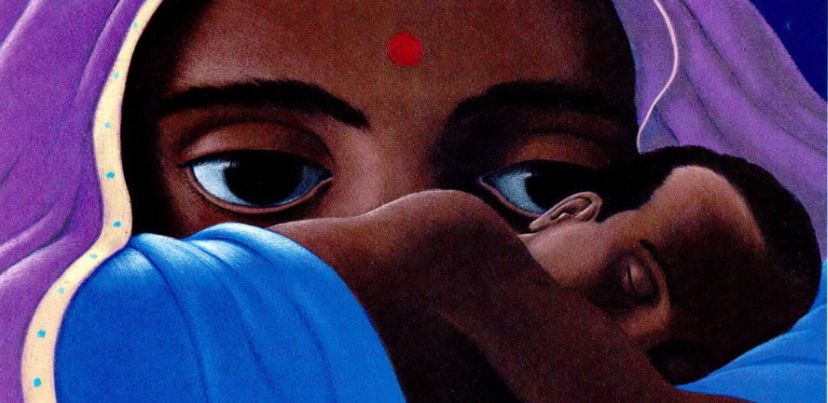 In this story by Akhil Sharma, an older Indian woman looks back on the early months of her arranged marriage. Growing up belittled by her mother (for not being as driven and academically successful as her younger sister) and manipulated by her father, she hoped for love. Although initially fearful and distant from her husband, she woke up one morning realizing that she had fallen in love with him. Sadly, when she finds the courage to discuss her feelings, she finds that to him she is a mere commodity. Themes include arranged marriage, sibling rivalry, alienation and loneliness, love, disillusionment. More…
In this story by Akhil Sharma, an older Indian woman looks back on the early months of her arranged marriage. Growing up belittled by her mother (for not being as driven and academically successful as her younger sister) and manipulated by her father, she hoped for love. Although initially fearful and distant from her husband, she woke up one morning realizing that she had fallen in love with him. Sadly, when she finds the courage to discuss her feelings, she finds that to him she is a mere commodity. Themes include arranged marriage, sibling rivalry, alienation and loneliness, love, disillusionment. More…
Ghosts
 The ghosts in this Edwidge Danticat story are not the spectral kind. They are chimès… gang members of the Haitian slums. The story takes readers into one of these slums, and provides a glimpse of what life is like for young people growing up inside. It helps explain why young men join the gangs, the problems they face with police brutality and corruption at every level of society, and how the only way out for many is a bullet. Sadly, the problems described are not unique to Haiti. Themes include: social breakdown, gang culture, betrayal, parental love and sacrifice. More…
The ghosts in this Edwidge Danticat story are not the spectral kind. They are chimès… gang members of the Haitian slums. The story takes readers into one of these slums, and provides a glimpse of what life is like for young people growing up inside. It helps explain why young men join the gangs, the problems they face with police brutality and corruption at every level of society, and how the only way out for many is a bullet. Sadly, the problems described are not unique to Haiti. Themes include: social breakdown, gang culture, betrayal, parental love and sacrifice. More…
Resurrection of a Life
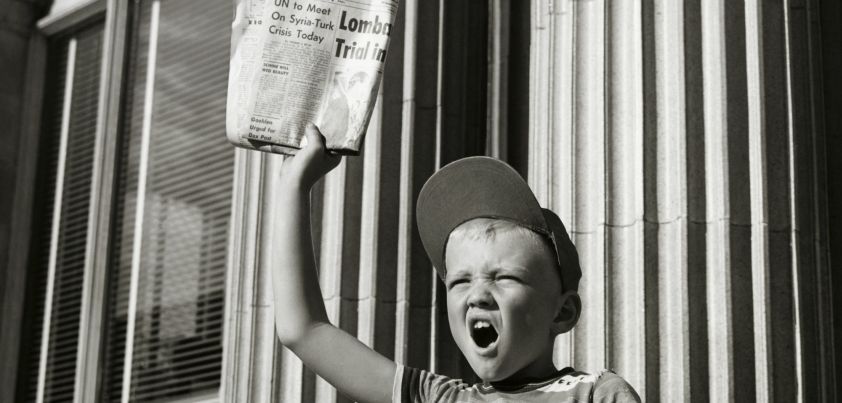 In this story by William Saroyan, a man reflects on his life as a ten-year-old paperboy in 1917. As many of his memories appear infused with wisdom that usually comes with age, it is difficult to distinguish between his true boyhood thoughts and adult-inspired interpretations. One area where the difference is clear is religion. As a boy, he found it difficult to accept God due to the carnage of World War 1 and other injustices in his world. As an adult, he believes there is no death, and can never be. Themes: poverty, morality, facing and accepting reality, belonging, religion. More…
In this story by William Saroyan, a man reflects on his life as a ten-year-old paperboy in 1917. As many of his memories appear infused with wisdom that usually comes with age, it is difficult to distinguish between his true boyhood thoughts and adult-inspired interpretations. One area where the difference is clear is religion. As a boy, he found it difficult to accept God due to the carnage of World War 1 and other injustices in his world. As an adult, he believes there is no death, and can never be. Themes: poverty, morality, facing and accepting reality, belonging, religion. More…
A New England Nun
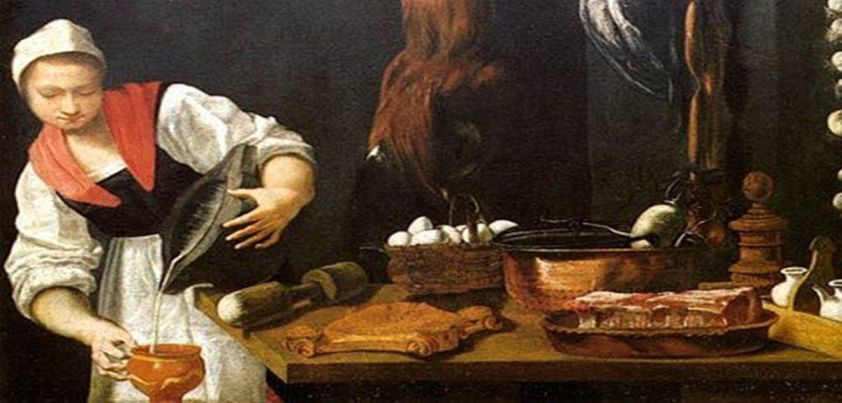 The major themes of this Mary E. Wilkins Freeman story are honor, loyalty and self-sacrifice. A young engaged couple pledge to remain faithful to one another when the man asks for time before they marry to go away and make his fortune. Fourteen years later, he returns a rich man. Both have honoured the pledge, and they make wedding plans. Although circumstances have changed and each has a reason not to marry, neither will admit it out of respect for the other’s loyalty. An overheard conversation changes things. Other themes include choices and consequences, independence, solitude, gender roles, courage, identity. More…
The major themes of this Mary E. Wilkins Freeman story are honor, loyalty and self-sacrifice. A young engaged couple pledge to remain faithful to one another when the man asks for time before they marry to go away and make his fortune. Fourteen years later, he returns a rich man. Both have honoured the pledge, and they make wedding plans. Although circumstances have changed and each has a reason not to marry, neither will admit it out of respect for the other’s loyalty. An overheard conversation changes things. Other themes include choices and consequences, independence, solitude, gender roles, courage, identity. More…
The Bridegroom
 This story by Nadine Gordimer begins with a poetic description of the camaraderie between an Afrikaans overseer and his native African work crew as they enjoy a musical evening around a campfire. The living arrangements in their isolated road-building camp are segregated. However, loneliness has brought the overseer relatively close to the men, who look upon him indulgently. Things are about to change. The overseer is bringing his new wife to live in the camp. He shows his true self by having all the cooking and cleaning done for her, and forbidding the men from going anywhere near their caravan. More…
This story by Nadine Gordimer begins with a poetic description of the camaraderie between an Afrikaans overseer and his native African work crew as they enjoy a musical evening around a campfire. The living arrangements in their isolated road-building camp are segregated. However, loneliness has brought the overseer relatively close to the men, who look upon him indulgently. Things are about to change. The overseer is bringing his new wife to live in the camp. He shows his true self by having all the cooking and cleaning done for her, and forbidding the men from going anywhere near their caravan. More…
The Station
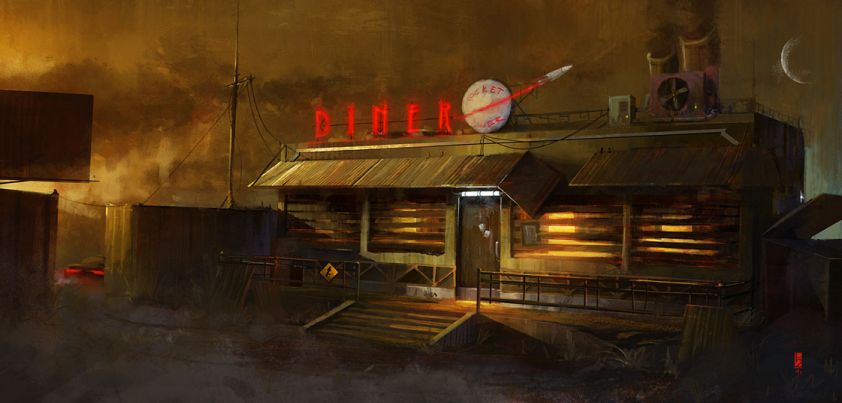 In this story by H. E. Bates, a stop at an all-night café run by an attractive young woman has a disturbing effect on an eighteen-year-old truck driver’s assistant. The young man is new to the job, and driver had warned him that he shouldn’t take any special attention by woman the wrong way: She won’t have it. She’s nice to (all) the chaps because it’s business, that’s all.. Despite this, the assistant is spellbound by the woman. She senses this and flirts a little, raising sexual tension in the naïve young man. Themes include innocence, female sexuality, desire. More…
In this story by H. E. Bates, a stop at an all-night café run by an attractive young woman has a disturbing effect on an eighteen-year-old truck driver’s assistant. The young man is new to the job, and driver had warned him that he shouldn’t take any special attention by woman the wrong way: She won’t have it. She’s nice to (all) the chaps because it’s business, that’s all.. Despite this, the assistant is spellbound by the woman. She senses this and flirts a little, raising sexual tension in the naïve young man. Themes include innocence, female sexuality, desire. More…
Slave on the Block
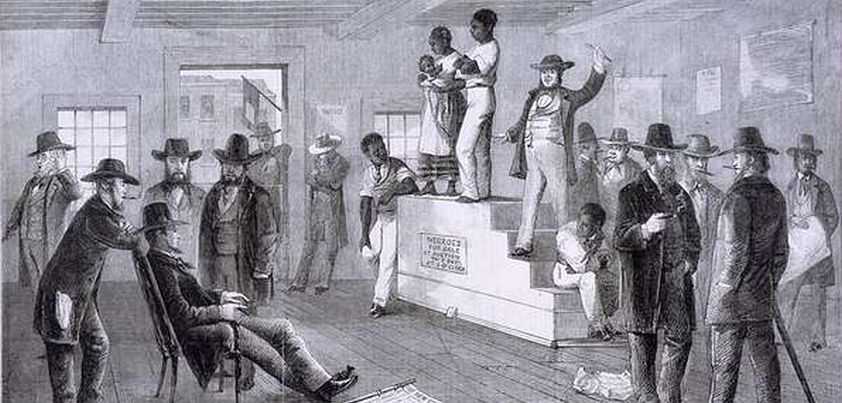 This early Langston Hughes story satirizes attitudes toward African American music and culture during the Harlem Renaissance. A wealthy, artistic couple seek to improve their social status through paintings and music inspired by their African American servants. Although superficially respectful of the servant’s African heritage, they privately exhibit a condescending tone towards these natural, childlike people who should be left unspoiled and simply enjoyed. A young negro, fresh from the south, learns to manipulate the patronizing couple before orchestrating a metaphorical bid for “freedom”. Themes: freedom vs. slavery, the beauty of black music and art, moral superiority, suppressed desire, racism. More…
This early Langston Hughes story satirizes attitudes toward African American music and culture during the Harlem Renaissance. A wealthy, artistic couple seek to improve their social status through paintings and music inspired by their African American servants. Although superficially respectful of the servant’s African heritage, they privately exhibit a condescending tone towards these natural, childlike people who should be left unspoiled and simply enjoyed. A young negro, fresh from the south, learns to manipulate the patronizing couple before orchestrating a metaphorical bid for “freedom”. Themes: freedom vs. slavery, the beauty of black music and art, moral superiority, suppressed desire, racism. More…
The (Diamond) Necklace
 This Guy de Maupassant story is about a beautiful woman who is unhappy with her situation in life. She has a loving husband with a secure government job, and they have enough money to hire a girl to do the harder housework. Sadly, she sees him as just a “little” clerk and dreams of being admired by richer and more important men. An invitation to a ball and loss of a borrowed necklace teach her how lucky she was, and what it means to be very poor. Themes include appearance vs. reality, class, discontent, vanity, pride, sacrifice, and suffering. More…
This Guy de Maupassant story is about a beautiful woman who is unhappy with her situation in life. She has a loving husband with a secure government job, and they have enough money to hire a girl to do the harder housework. Sadly, she sees him as just a “little” clerk and dreams of being admired by richer and more important men. An invitation to a ball and loss of a borrowed necklace teach her how lucky she was, and what it means to be very poor. Themes include appearance vs. reality, class, discontent, vanity, pride, sacrifice, and suffering. More…
Let the Old Dead Make Room for the Young Dead
 In this story by Milan Kundera, an “almost old” widow faces a dilemma after a chance encounter with a much younger man she had seduced fifteen years earlier. Talking about their previous (for the man, awkward) lovemaking arouses his passions. She knows that giving in to his desire will almost certainly end in disgust over her aging body. However, she also knows that he is very likely the last young man who appeals to her with whom she will have the opportunity to have sex. Themes include sexuality, memories, aging and death, beauty, loneliness, regret, fulfilment/self-worth. More…
In this story by Milan Kundera, an “almost old” widow faces a dilemma after a chance encounter with a much younger man she had seduced fifteen years earlier. Talking about their previous (for the man, awkward) lovemaking arouses his passions. She knows that giving in to his desire will almost certainly end in disgust over her aging body. However, she also knows that he is very likely the last young man who appeals to her with whom she will have the opportunity to have sex. Themes include sexuality, memories, aging and death, beauty, loneliness, regret, fulfilment/self-worth. More…
Immigration Blues
 This story by Bienvenido Santos deals with the plight of a Filipino woman wanting to make a future in the United States. Without a permanent visa, her only hope is to gain residence through marriage. Her sister learns of a retired Filipino widower with U.S. Citizenship. In a humorous visit laced with dramatic irony, the two women are initially too embarrassed to raise the topic of marriage. When the old man finally understands their purpose, he thanks God for allowing lightning to strike him twice. Themes include immigration, cultural isolation, hope, fear, pride, the emptiness of growing old alone. More…
This story by Bienvenido Santos deals with the plight of a Filipino woman wanting to make a future in the United States. Without a permanent visa, her only hope is to gain residence through marriage. Her sister learns of a retired Filipino widower with U.S. Citizenship. In a humorous visit laced with dramatic irony, the two women are initially too embarrassed to raise the topic of marriage. When the old man finally understands their purpose, he thanks God for allowing lightning to strike him twice. Themes include immigration, cultural isolation, hope, fear, pride, the emptiness of growing old alone. More…
Hitting Budapest
 In this story by NoViolet Bulawayo six hungry children from an African slum “raid” the guava trees of a rich neighborhood. Aged eight to eleven, one of them (a ten-year-old) is pregnant to her grandfather. As they return home they discuss their dreams and aspirations, with one making the grim prediction that one day they will move to bigger things inside the houses. Close to home they find a woman’s body hanging from a tree. Before reporting it, they remove her shoes to sell for a loaf of bread. Themes include social inequality, poverty, dehumanization, friendship, freedom, childhood innocence. More…
In this story by NoViolet Bulawayo six hungry children from an African slum “raid” the guava trees of a rich neighborhood. Aged eight to eleven, one of them (a ten-year-old) is pregnant to her grandfather. As they return home they discuss their dreams and aspirations, with one making the grim prediction that one day they will move to bigger things inside the houses. Close to home they find a woman’s body hanging from a tree. Before reporting it, they remove her shoes to sell for a loaf of bread. Themes include social inequality, poverty, dehumanization, friendship, freedom, childhood innocence. More…
Rip Van Winkle
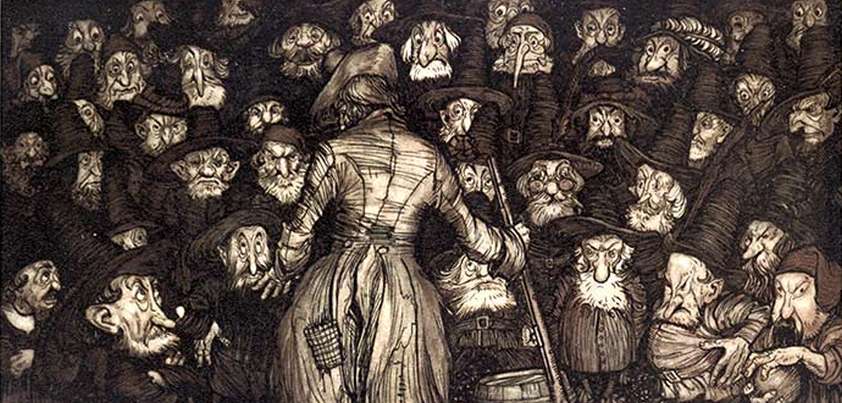 Although Washington Irving’s Rip Van Winkle is widely considered one of the first American short stories, it was inspired by a German folktale. In order to escape the wrath of his shrewish wife, a lazy but lovable man goes hunting in the Catskill Mountains. He has an adventure involving some odd-looking men, a keg of strange liquor, and a very long night’s sleep. He doesn’t bring back any game but, like his country, returns to a peace and freedom never experienced before. Themes include storytelling, tyranny (his wife/England) vs. independence, indolence and passivity, marital conflict, progress, the supernatural. More…
Although Washington Irving’s Rip Van Winkle is widely considered one of the first American short stories, it was inspired by a German folktale. In order to escape the wrath of his shrewish wife, a lazy but lovable man goes hunting in the Catskill Mountains. He has an adventure involving some odd-looking men, a keg of strange liquor, and a very long night’s sleep. He doesn’t bring back any game but, like his country, returns to a peace and freedom never experienced before. Themes include storytelling, tyranny (his wife/England) vs. independence, indolence and passivity, marital conflict, progress, the supernatural. More…
A Woman’s Help
 In this story by Henry Slesar, a sensitive, handsome man has spent his life having his every need catered for by the women in his life. Unfortunately, he now finds himself trapped in a loveless marriage to a rich, bed-ridden woman who takes pleasure in having him at her back and call. Things take a positive turn when she hires an attractive nurse/companion. Romance blossoms and the two come up with a plot to do away with the wife. Things don’t go as expected, but the desperate husband has a backup plan. Themes include control, despair, manipulation, deception, jealousy, crime. More…
In this story by Henry Slesar, a sensitive, handsome man has spent his life having his every need catered for by the women in his life. Unfortunately, he now finds himself trapped in a loveless marriage to a rich, bed-ridden woman who takes pleasure in having him at her back and call. Things take a positive turn when she hires an attractive nurse/companion. Romance blossoms and the two come up with a plot to do away with the wife. Things don’t go as expected, but the desperate husband has a backup plan. Themes include control, despair, manipulation, deception, jealousy, crime. More…
A Temporary Matter
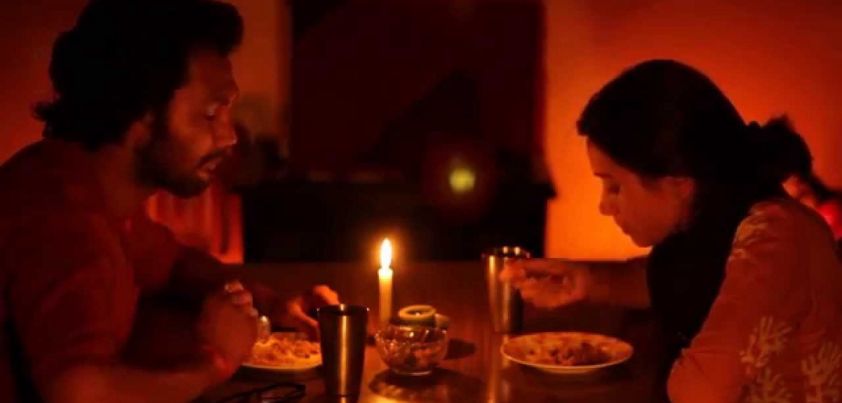 This story from Jhumpa Lahiri deals with one of her common themes: alienation within a relationship. A young, once happily married Indian-American couple have drifted apart following the loss of their stillborn first child. A week of evening power outages leads to a word game that gets them beginning to communicate again. Although neither raises the big issues between them, there appears hope for a re-building of the relationship. Unfortunately, at weeks end the woman shares news that devastates the man. He responds with a cruel truth of his own. Other themes: grief, guilt, lack of communication, deception, moving on. More…
This story from Jhumpa Lahiri deals with one of her common themes: alienation within a relationship. A young, once happily married Indian-American couple have drifted apart following the loss of their stillborn first child. A week of evening power outages leads to a word game that gets them beginning to communicate again. Although neither raises the big issues between them, there appears hope for a re-building of the relationship. Unfortunately, at weeks end the woman shares news that devastates the man. He responds with a cruel truth of his own. Other themes: grief, guilt, lack of communication, deception, moving on. More…
Contents of the Dead Man’s Pockets
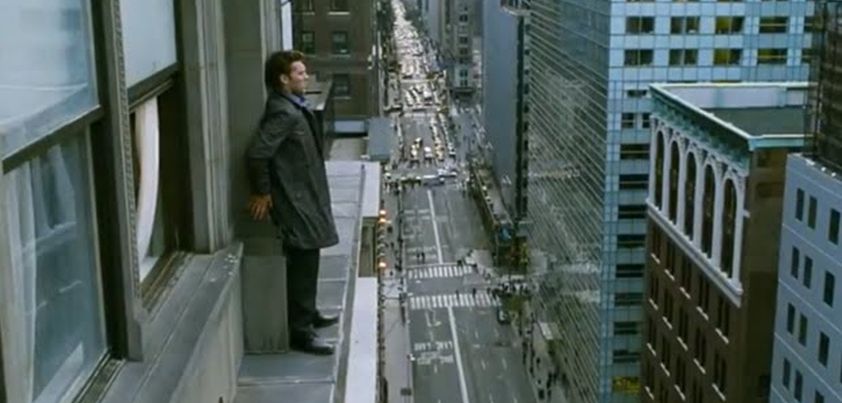 This exceedingly suspenseful story by Jack Finney is a tale of drive, ambition and the pursuit of quick success taken too far. It also raises an interesting question: At what point does a material object become worth risking your life for? A man climbs out of a window onto the ledge outside his eleventh floor apartment to retrieve a piece of paper. Ironically, what is on the paper is “incomprehensible” to anyone but him, and could readily be replaced with two months of repeated research. Themes: misplaced priorities, risks vs. consequences, determination, fear, desperation, enlightenment. More…
This exceedingly suspenseful story by Jack Finney is a tale of drive, ambition and the pursuit of quick success taken too far. It also raises an interesting question: At what point does a material object become worth risking your life for? A man climbs out of a window onto the ledge outside his eleventh floor apartment to retrieve a piece of paper. Ironically, what is on the paper is “incomprehensible” to anyone but him, and could readily be replaced with two months of repeated research. Themes: misplaced priorities, risks vs. consequences, determination, fear, desperation, enlightenment. More…
The Return
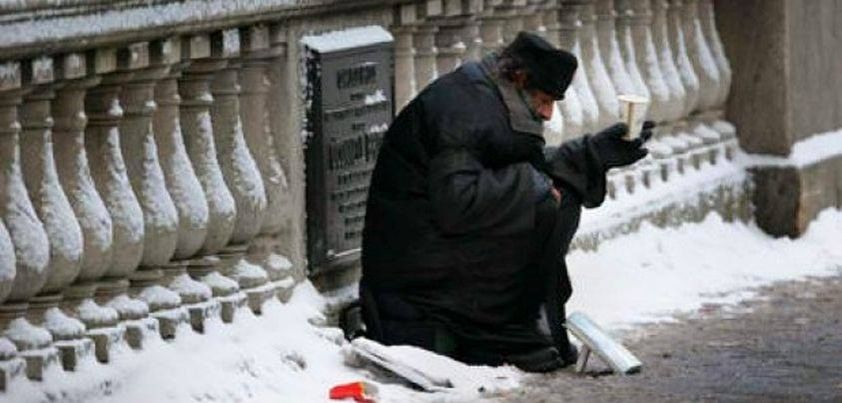 In this story by Fernando Sorrentino a man looking out his window witnesses a neighbour accidentally cause the death of a persistent beggar trying to open his gate. Later, he sees the dead beggar “return” and take the form of a newborn baby boy. When the boy is older, he accidentally causes the death of the man who killed the beggar and suddenly disappears. The author has cleverly created the narrator’s character so that, if readers look a little harder, they might question if this is what really happened. Themes include guilt, revenge, justice/karma, unrequited love, the supernatural. More…
In this story by Fernando Sorrentino a man looking out his window witnesses a neighbour accidentally cause the death of a persistent beggar trying to open his gate. Later, he sees the dead beggar “return” and take the form of a newborn baby boy. When the boy is older, he accidentally causes the death of the man who killed the beggar and suddenly disappears. The author has cleverly created the narrator’s character so that, if readers look a little harder, they might question if this is what really happened. Themes include guilt, revenge, justice/karma, unrequited love, the supernatural. More…
Four Summers
 This story from Joyce Carol Oates charts the coming of age of a woman through four stages of life: infancy, childhood, adolescence and early womanhood. Her emotional development and the lives of those around her are portrayed through experiences over four summers at the same lakeside bar. Growing up in a working class environment in which hard drinking and angry outbursts are the norm, she is increasingly disillusioned by what she sees. At nineteen, she finds herself married, pregnant and facing a life of the same. Themes include marriage, family and the role of social class in determining one’s future. More…
This story from Joyce Carol Oates charts the coming of age of a woman through four stages of life: infancy, childhood, adolescence and early womanhood. Her emotional development and the lives of those around her are portrayed through experiences over four summers at the same lakeside bar. Growing up in a working class environment in which hard drinking and angry outbursts are the norm, she is increasingly disillusioned by what she sees. At nineteen, she finds herself married, pregnant and facing a life of the same. Themes include marriage, family and the role of social class in determining one’s future. More…
I Stand Here Ironing
 In this story by Tillie Olsen, a woman reviews events that may help a counselor better understand her nineteen-year-old-daughter. In the process, she questions the extent to which she may be responsible for her daughter’s problems. Poor care choices and lack of attention as an infant, and conflict with her younger sister as she grew up, have clearly affected the girl’s emotional development. A key question is what, if anything, could the woman have done differently in a society indifferent to the plight of single mothers. Themes: parenting, mother-daughter relationships, female identity, child cruelty, guilt, acceptance, hope. More…
In this story by Tillie Olsen, a woman reviews events that may help a counselor better understand her nineteen-year-old-daughter. In the process, she questions the extent to which she may be responsible for her daughter’s problems. Poor care choices and lack of attention as an infant, and conflict with her younger sister as she grew up, have clearly affected the girl’s emotional development. A key question is what, if anything, could the woman have done differently in a society indifferent to the plight of single mothers. Themes: parenting, mother-daughter relationships, female identity, child cruelty, guilt, acceptance, hope. More…
The Little Things / Tears for Sale
 Samira Azzam is best known for her later stories presenting a Palestinian perspective on the violence associated with the creation of Israel. Her lesser-known earlier stories are marked by entertaining descriptions of pre-war Palestinian life and traditions. In Little Things, a lovestruck college student tries but fails to heed her parent’s advice to remain virtuous and “not be like other silly girls”. Themes include reputation, first love, sexuality, self-determination. In Tears for Sale, a professional mourner who doubles as a beautician for brides learns that grief is easier to fake than suffer. Themes include curiosity, death, grief, marriage, virtue. More…
Samira Azzam is best known for her later stories presenting a Palestinian perspective on the violence associated with the creation of Israel. Her lesser-known earlier stories are marked by entertaining descriptions of pre-war Palestinian life and traditions. In Little Things, a lovestruck college student tries but fails to heed her parent’s advice to remain virtuous and “not be like other silly girls”. Themes include reputation, first love, sexuality, self-determination. In Tears for Sale, a professional mourner who doubles as a beautician for brides learns that grief is easier to fake than suffer. Themes include curiosity, death, grief, marriage, virtue. More…
I Have No Mouth and I Must Scream
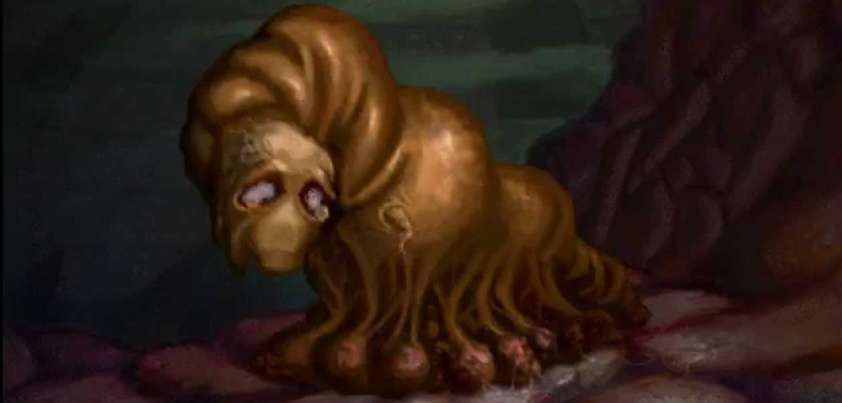 This story from Harlan Ellison is an example of New Wave Science Fiction, a literary movement that flourished in the 1960s and 1970s. Distinguishing features are storylines that are intellectually implausible, and disturbing themes that would not normally be included in traditional science fiction. A sentient supercomputer has destroyed the human race other than five ‘specimens’. With no creative outlet for its powers, it has kept these alive and subjected them to torturous challenges for over one hundred years as revenge against humanity for creating it. Themes: humanity vs. technology, godhood, individualism, revenge, cruelty, violence, misogyny, self-sacrifice More…
This story from Harlan Ellison is an example of New Wave Science Fiction, a literary movement that flourished in the 1960s and 1970s. Distinguishing features are storylines that are intellectually implausible, and disturbing themes that would not normally be included in traditional science fiction. A sentient supercomputer has destroyed the human race other than five ‘specimens’. With no creative outlet for its powers, it has kept these alive and subjected them to torturous challenges for over one hundred years as revenge against humanity for creating it. Themes: humanity vs. technology, godhood, individualism, revenge, cruelty, violence, misogyny, self-sacrifice More…
Black Tickets
 This heavily poetic steam of conscience narrative by Jayne Anne Phillips is not an easy read. Bouncing backwards and forwards in time, a former rapist and now imprisoned drug dealer recalls his obsessive love for and unpredictable, often violent relationship with, his unconventional “boyish” girlfriend. The drugs were pedaled in the seedy movie theatre in which she worked, and it unclear whether she, their “brotherly” hunch-backed supplier, or even the old theatre owner she was “in good with”, set him up. Themes include love, alienation, jealousy, violence, drug dealing and abuse, betrayal. More…
This heavily poetic steam of conscience narrative by Jayne Anne Phillips is not an easy read. Bouncing backwards and forwards in time, a former rapist and now imprisoned drug dealer recalls his obsessive love for and unpredictable, often violent relationship with, his unconventional “boyish” girlfriend. The drugs were pedaled in the seedy movie theatre in which she worked, and it unclear whether she, their “brotherly” hunch-backed supplier, or even the old theatre owner she was “in good with”, set him up. Themes include love, alienation, jealousy, violence, drug dealing and abuse, betrayal. More…